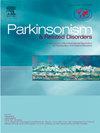Can we detect cognitive “super-agers” in Parkinson's disease? Cognitive, neuropsychiatric and motor outcomes in the first 10 years of Parkinson's disease
IF 3.1
3区 医学
Q2 CLINICAL NEUROLOGY
引用次数: 0
Abstract
Introduction
Superagers are older individuals who resist age-related cognitive decline and who perform just as well or better than younger people in cognitive tasks. In healthy aging studies, superagers not only experience positive cognitive outcomes (e.g. lower risk of future mild cognitive impairment), but may also experience fewer depressive and anxiety symptoms as they age. We seek to identify superagers in Parkinson's disease (PD) and potential outcomes associated with superager status.
Methods
Data was gathered from the Parkinson's Progression Markers Initiative (PPMI). 689 individuals newly diagnosed with PD were assessed annually for up to 10 years. Participants were classified into three groups: superagers, cognitively normal, and PD mild cognitive impairment (PD-MCI). Multilevel models examined longitudinal group differences in global cognition, depression, anxiety, and motor severity.
Results
A significant main effect of group revealed that superagers performed better than the PD-MCI and cognitively normal groups in global cognition. There were significant group by time interactions, revealing the superagers group was on a more favorable longitudinal trajectory relative to other two groups. Superagers also reported less severe depressive and anxiety symptoms compared to the PD-MCI and the cognitively normal groups. Superagers had a more favorable trajectory of motor symptom severity relative to the cognitively normal and PD-MCI groups.
Conclusion
Superagers with PD may be detected with neuropsychological testing and appear to resist the effects of neurodegeneration in Parkinson's disease. Cognitive studies and trials may benefit from incorporating the concept of superagers, as opposed to a single homogenous cognitively normal group.
求助全文
约1分钟内获得全文
求助全文
来源期刊

Parkinsonism & related disorders
医学-临床神经学
CiteScore
6.20
自引率
4.90%
发文量
292
审稿时长
39 days
期刊介绍:
Parkinsonism & Related Disorders publishes the results of basic and clinical research contributing to the understanding, diagnosis and treatment of all neurodegenerative syndromes in which Parkinsonism, Essential Tremor or related movement disorders may be a feature. Regular features will include: Review Articles, Point of View articles, Full-length Articles, Short Communications, Case Reports and Letter to the Editor.
 求助内容:
求助内容: 应助结果提醒方式:
应助结果提醒方式:


